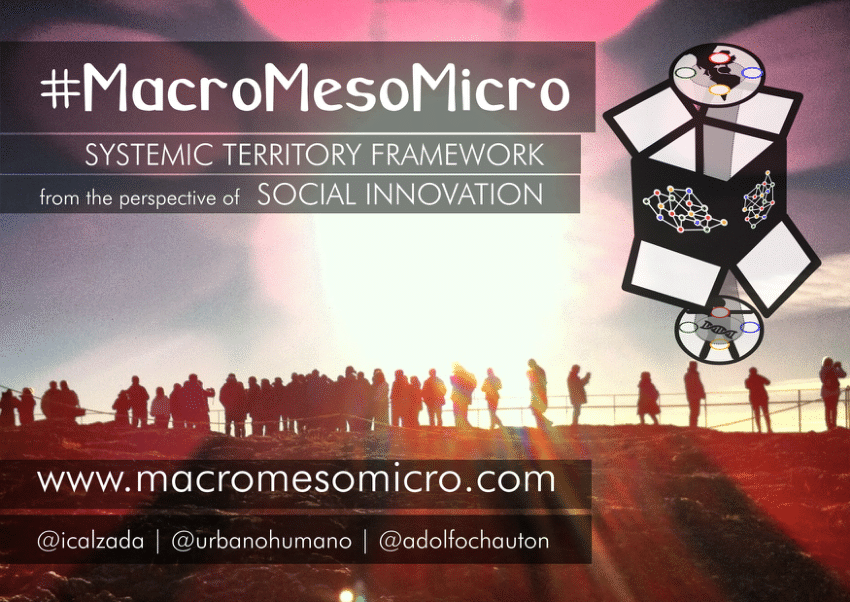
Situated Collective Intelligence
We are the first generation that rejects the values of our parents’ generation to recover those of our grandparents.
Gian Luca Ranno (gnammo.com)
Without a doubt, mine is a generation marked by new technologies, the generation of computers, the internet, and smartphones; a very particular generation, not to be confused with the younger “digital natives”. It is a bridge generation, born in an analog world but which quickly adopted and understood the new digital world and the network.
As Gian Luca rightly says, ours is also the generation that is rediscovering the social and economic balances typical of our grandparents’ generation.
It’s clear that we live in a very special historical moment. The world we inherited is noticeably different from how we had imagined it.
During the last decades, we have assimilated a whole series of economic and cultural globalization mechanisms, thanks also to a good dose of media entertainment accompanied by constant information bombardment. We have seen how a lifestyle model has been normalized that, besides being unsustainable, is fundamentally detached from local realities. All our professional ambitions and a certain lifestyle have definitively become a priority over any other type of consideration that could give more importance to the local and relational context.
While knowledge becomes increasingly accessible, the relationship between the production process and the places where it occurs weakens. In other words, production processes, whether related to knowledge, services, or material goods, have been structured following a global logic to the detriment of any other local condition or need.
In this process, the role of technology is fundamental. On one hand, it favors communication and thus access to global knowledge, but on the other hand, it promotes an economy and a global culture that loses sight of the need for a relationship between economic and cultural activities and the territories in which they develop.
According to Pierre Levy (1994), we live in an anthropological space that he defines as the space of the flows of goods, where fundamental activities can be grouped into three major categories: production, transaction, and communication. In this ecosystem, each one’s identity is directly conditioned by the professional role they play in one of these three categories. Therefore, our social identity is largely defined by our work, which in most cases is salaried and hence strongly dependent on economic mechanisms over which most people are never called to opine.
We have uprooted the development of our social identity from the reality of our territories, at the service of a globalized economic-productive mechanism. In this ecosystem, universities themselves seem to have lost their way, shifting their axis of action from research to certification. The university becomes one more ring in the series of institutions that instead of promoting greater critical sense and thus balancing our biopolitical condition that could introduce elements of escape towards greater independence and freedom, ends up promoting a terrible mechanism of homogenization with the simple objective of preparing specialized labor for production machines.
In recent years, this mechanism has become more perverse due to the incipient process of precarization that precisely affects what I have called the bridge generation, which however has not reacted, as I see it, with the necessary determination. Many, faced with the decline of an entire economic-professional ecosystem, have preferred to opt for training experiences thinking that in this way they would increase their chances of getting, in a more or less near future, a job related to their professional field.
These reflections do not want to be, in any way, an act of accusation against my generation; rather it is a first reasoning to start opening a more serious reflection on our real capacity to analyze the world in which we are living and to know how to react.
I have the feeling that we have been victims of a huge cultural homogenization that fortunately does not seem to be advancing and that, just now, forces us to make certain types of decisions that turn out to be much braver than we could have imagined.
Most of the people who make up my social environment, and who are of my generation, have been or continue to be very active in different processes of social transformation. Curiously, none of us, not even in our most radical aspirations for social transformation, including the most revolutionary ones, had considered the problem of being unemployed or having, in any case, to face the terrible situation of precarization that afflicts us. It seems that we took for granted that our professional preparation would have, in one way or another, offered us a position from which to act to transform and improve society; always being able to count on a certain economic tranquility (which in a certain way would have arrived thanks to an economic balance actually coming from the same industrial and consumerist model that many of us wanted and continue to want to change).
The bridge generation finds itself in an unusual life situation, a situation that has pushed us to accept practically everything, projecting us into a mechanism that has led us to live in the “global city” that Saskia Sassen talked about in the nineties.
It doesn’t matter
where we are, the important thing is to have a job that is as much as possible related to what we have studied. Tomorrow will be seen. We change cities, countries, and even continents if necessary. Our social network survives thanks to social media; with Twitter, Facebook, and Instagram, we are in contact with the people who make up our social ecosystem, mixing people and situations in a chaotic relational mechanism.
Our activism in favor of change, transformation, and improvement of society continues nonetheless at a distance. We are all connected. We exchange ideas and organize ourselves to create a great cultural and social innovation movement, increasingly open and collaborative.
Communication opens up to new models, which do not replace the usual ones, but surely expand and enrich them. With the Internet, we are now “prosumers”, that is, producers and consumers at the same time; and we consume information produced by friends and acquaintances. Slowly, the media bombardment, with its synchronization, its newscasts that always show the same people and the same type of news, begins to make room for the frivolities published by our friends on Facebook, as well as their political thoughts and their reflections on what happens around them. We talk more and more about ourselves, surely with a certain hedonistic tendency, but at the same time, this also allows us to know our friends and even ourselves.
The constant exchange of information, without intermediaries, allows us to experience first-hand the mechanisms of collective intelligence that Pierre Levy talked about in the nineties. The social implications of these mechanisms are enormous, as they promote a change in the definition and perception of personal identity that becomes directly linked to the knowledge that each person has. They are the signs of the breaking of the wall of distrust.
Identities then become knowledge identities. The ethical consequences of this new institution of subjectivity are immense: who is the other? It is someone who knows. And who knows, moreover, things that I do not know. The other is no longer a horrible, threatening being: like me, he ignores much and dominates certain knowledge. (Pierre Levy 1994)
According to Levy, we are promoting a new space of knowledge that is activated thanks to the experimentation of new human relationships based on the valorization of people based on their knowledge and skills, without the need to resort to a classification imposed by belonging to a certain social, professional, or economic category and clearly without the need for any type of academic or training certification. Totally contrary to what, however, universities promote today, just to mention one of the most important institutions of modern society.
Thanks to these mechanisms of collective intelligence that occur at a global level, a new awareness of different local realities begins to develop. We start to see the first cracks. Here again, the bridge generation comes into play, becoming the main promoter of a new care for things, territories, and the people around us.
We find ourselves in front of a kind of return to reality, a new condition of life where everyday activities are again related to the dynamics that characterize the identity of the places we inhabit. We begin to rediscover the territory and the communities of which we are a part.
In this process, new communication technologies have acquired a decisive role. This is a phenomenon in complete contrast to the dynamics promoted by the technological development of the three industrial revolutions that preceded us, which, as we have seen, have progressively promoted a certain distancing of society from the physical dimension and therefore from the territory.
You may also like
Bridging the Gaps: Unveiling the Interconnected Realms of Civic Life
For several years now, I have been immersed in doctoral research. Initially, I focused on physical-d
MacroMesoMicro. Systemic Territory Framework from the perspective of the Social Innovation
This publication aims to take a step back to gain momentum and propose, by unfolding, a Systemic Fra
Does Public Space Change with the Rise of the Internet?
According to Giovanni Sartori, the factors and processes that shape a person and transform them into






Post a comment